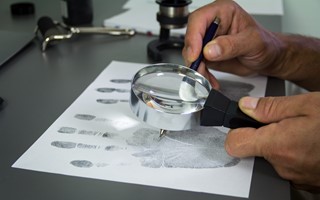News September 14, 2021
New legislation, which came into effect on June 29th 2021, saw the maximum sentence for animal cruelty convictions raised from six months to five years. This is a significant development for animal rights activists, who have been campaigning relentlessly for tougher sentences and harsher penalties in animal abuse cases.
With the new measures, providing the Courts with some of the toughest sentencing powers in Europe, veterinary professionals will need to be equipped to deal with often difficult cases related to animal welfare. Tapping into our veterinary expertise, our bespoke Animal Forensics E-learning courses will prepare veterinary staff for forensic examination in animal abuse and welfare cases. Jointly written by forensic and veterinary experts, attendees will be able to unify the care and treatment of animals with the standards and regulations required by the legal system.
The course has been created for both Veterinary Surgeons and Nurses:
Veterinary Surgeons
16 Hours CPD // £329 + VAT
Whether alive, in need of treatment or euthanasia, and even when they have passed away, your clinical expertise and forensic awareness will be required to thoroughly and impartially assess all animals of concern. You will follow a real welfare investigation as you progress through the course, creating your own forensic casefile, to support the accurate recording of your observations.
This course also explores the difficult subject of non-accidental injury to animals, whilst also providing a support system for referrals and confidentiality breaches in the most challenging of cases. In addition, you will tackle issues regarding the determination of suffering, owner compliance and dissent, and the seizure and certification of animal abuse investigations. You will also have the opportunity to ask your own questions in a secure discussion forum, or seek advice on confidential topics via private messaging.
With insight and guidance from a range of forensic specialists, you will learn how to gather and preserve appropriate forensic samples, and how to document contemporaneous actions in note, diagram and photographic forms. By utilising specific templates, you will be able to demonstrate a secure chain of custody at all times – whether at the Practice, on a home visit, or at the crime scene. Designed for use in busy veterinary practices, this course provides downloadable Court-complaint forms, allowing you to manage all aspects of an investigation whilst maintaining the utmost care and consideration to the animals.
Veterinary Nurses
8 Hours CPD // £249 + VAT
This is the first course of its kind that’s designed specifically for Veterinary Nurses (VNs) with a focus on welfare investigations. Such matters require a team approach and you have a unique and essential role to play in this process. Alongside assisting the Veterinary Surgeon (VS), you spend more time with the animals than any other professional. Equally, owners tend to form strong relationships with VNs, and therefore you are perfectly positioned to obtain key information that may otherwise be overlooked.
Designed to support you and the VS, you will create your own forensic casefile as you progress through a real welfare investigation. You will also be provided with advice from both forensic and veterinary specialists, including a framework for dealing with animals (and owners) involved in non-accidental injury cases.
By using the downloadable Court-compliant forms, you will learn how to create contemporaneous records in note, diagram and photographic form. Additionally, you will explore the recognition and recovery of evidence, how to prepare such material for forensic analysis, and how to maintain a secure chain of custody for the animals in your care.
Course outcomes
- Explore the role of veterinary professionals by studying a range of real animal welfare investigations.
- Create a forensic casefile as you progress through a welfare case, which includes the clinical examination of an animal, their surrounding and the recovery of appropriate evidential material.
- Use standardised forensic processes and documentation methods to record clinical observations and expert opinions.
- Learn how to demonstrate a secure chain of custody at all times, whether handling living or dead animals.
- Receive practical advice regarding basic forensic photography and how to store digital files.
- Review specific sections of the Animal Welfare Act 2006, including how to define suffering, the appropriate use of Veterinary Certificates under the act, and the seizure and possession of animals.
- Appraise the contribution that traditional forensic specialists can bring to welfare investigations, including how to recognise, recover, and prepare various types of evidential material for analysis.
- Evaluate the similarities and differences between veterinary and forensic roles and responsibilities.
- Examine the links between animal abuse and human abuse.
- Study at an in-Practice case of non-accidental injury, with advice on how to tackle issues of client confidentiality and reporting your concerns.
- Gain practical experience, using your newly-acquired skills, to approach a variety of challenging animal welfare scenarios.
But don’t take our word for it, here’s what a handful of past attendees thought:
“The presentation style and format with a mix of text, photos, videos, questions, etc. keeps attention focused and aids learning.”
“Just a big thank you - the course exceeded my expectations.”
“There is very limited access to these types of courses and a few vet surgeons as well as nurses that I have worked with have encountered abuse cases and were unsure of how to go about them. I will definitely recommend this course to people that I have worked with, (or people that are interested in gaining more knowledge in forensics) as it was very detailed and easy to follow.”
The courses are online and participants work through them at their own pace.
For further information or to discuss the course in more detail, please contact us via email at vet@forensic-access.co.uk


